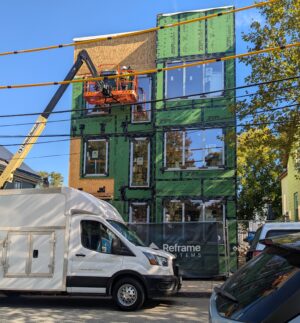
A Reframe Systems-built triple-decker on Gilman Street in East Somerville is seen under construction on Sept. 22, 2025. Photo by James Sanna | Banker & Tradesman Staff
Andover-based modular builder Reframe Systems wants to pitch itself as a partner of choice for small- to medium-size developers across Greater Boston and the rest of the country.
Its latest project, a triple-decker on Gilman Street in East Somerville, topped off earlier this month, showcases its approach, CEO Vikas Enti said.
Excluding land costs, construction is expected to come in at around $400,000 per unit, compared to $500,000 or $600,000 per unit for traditional contractors.
“We have all our own architects, we have all the trades we need at the factory, and some who come on-site,” he said. “We’re not having to pay markups to 25 different subcontractors. We’re actually able to absorb those inefficiencies and markups and ensure some of those could become savings for customers.”
The 13 Gilman St. development, being built on a lot next to the client’s house, is expected to be delivered in a little less than 90 days, Enti said. He compares that to a conventionally-built triple-decker on his block elsewhere in the city that started construction before he launched Reframe Systems, and is still being finished up.
The Gilman Street project takes advantage of Somerville’s citywide legalization of triple-deckers two years ago, lending added predictability to the build.
One secret to Reframe’s speed: Robots handle much of the rough framing in its Andover factory, freeing its apprentices and tradespeople to do higher-skill tasks across a number of trades at once. The room-sized building blocks that the factory spits out are pre-tested and pre-inspected, meaning builders save on delays waiting for individual parts of a project to be inspected or for a new set of subcontractors to arrive.
Once the modules are assembled and clad, only final municipal on-site inspections are necessary, Enti said.
View this post on Instagram
Those modular units are also small enough to navigate down narrow Massachusetts streets, and in many cases do double-duty as shipping containers for things like cabinetry boxes and heavy appliances.
While the company’s latest project is for an owner-operator, who plans to house family in some units and rent out others, Reframe sees its primary customer right now as developers building smaller projects and ambitious landowners wanting to build an ADU.
“How do you get a small-scale developer the same top-class team that a large developer would have access to on a small-scale project?” he said. “We get to emulate scale by using the factory. The factory is thinking about building a few hundred thousand square feet per year, and we get to apply all the benefits we get in terms of cost savings on our materials, all the sophistication we’re able to apply in project management or design or engineering.”
“All of our customers get the benefit of all the systems that come together that would otherwise only be reserved for a 200-unit apartment building, but that doesn’t have to be true anymore,” he added.
Eventually, Reframe hopes to be able to offer financing to its customers, as well, Enti added.
“We’ll bring he design, the building, the financing, and you provide the land. That’s how we’ll build more housing in these urban infill types of markets,” he said.






